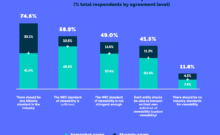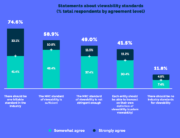Original Article: www.forbes.com
What do firm leaders think will happen to marketing this year? To find out, I turned to CEOs who represent a variety of different industries and companies.
Marketers will begin focusing on PR tech: Sharam Fouladgar-Mercer, CEO, AirPR
We can’t talk about MarTech without talking about PRTech, the increasingly important public relations and brand awareness aspect given the onset of content marketing. In regards to PRTech advancements, I think AI will continue to replace repetitive tasks for public relations and communications professionals. This includes things like manually creating spreadsheets of press placements or charts that show coverage volume. Human brain power will be reserved for more high-level strategy, not the granular tasks.
Marketers will begin creating more sophisticated strategic plans to leverage video: Brad Jefferson, CEO, Animoto
Today, video consumption is at an all-time high and more marketers than ever have started using it. But in 2017, simply using video won’t be enough. Marketers and businesses of all sizes looking to stand out will need to become more adept at video strategy, understanding everything from what makes a video engaging to A/B testing and how to manage TrueView and Facebook video ad campaigns. Video strategy and creation will be an increasingly desirable skillset to have, and businesses are hiring for it.
The gig economy will provide CMOs with opportunities to work in multiple firms: Art Saxby, CEO, Chief Outsiders
The Gig Economy is spreading and growing–from hiring a car and driver for 10 minutes or a condo by the beach for 3 days to hiring a hyper-specialized executive resource 1-2 days a week. Shifts in both technology and society now allow an accomplished senior executive to be an active member of the management team of two or three companies at once while living anywhere they want. It also means that mid-size companies now have access to executive resources that they could never before afford or attract. This ability for companies and executives to work virtually is enabled by SaaS of all varieties. This is a significant benefit to mid-market companies, giving them the ability to access talent and conduct business with an ever-increasing level of productivity as they add applications with zero effort and no IT overhead.
Voice-Related AI will take prominence in marketing discussions in 2017: Gregg Johnson, CEO, Invoca
Voice has always been central to how we communicate. With the spike in voice-related AI advancements this year, it’s poised to be even more essential in 2017. In 2016 alone, Google announced its own smart speaker and assistant, Apple opened Siri to third party developers, and Mary Meeker named voice a key trend in her annual internet trends report, saying that “voice-based interfaces are ramping quickly and creating a new paradigm for human-computer interaction.” People are already talking to Siri and Alexa about things they want to purchase — if they have questions in the decision making process, it is natural to continue that conversation with a robot or a human. Next year we will see voice capabilities move from a “nice to have” to the new killer feature, the new user interface.
E-Commerce will get a big boost from tech: Amit Sharma, Founder & CEO, Narvar
E-commerce companies need to think more like tech companies, using AI and machine learning to make shopping an organic part of how we experience daily life. Today, you can call an Uber with Amazon Echo and book a flight entirely through a Facebook Messenger bot. In 2017 brands will combine emerging tech like biometrics and location sensors with storytelling, design and predictive data to create truly individual experiences. By connecting data from multiple channels and building human-centered experiences, marketers will help you find products in your precise moment of need — and perhaps before you even perceive that need.”……READ MORE at: Original Article: www.forbes.com









